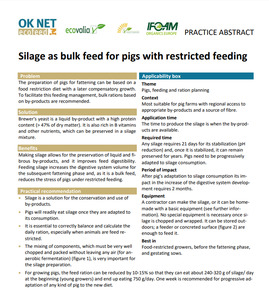{Tool} Silage as bulk feed for pigs with restricted feeding (OK-Net EcoFeed Practice Abstract). [El ensilaje como ración de volumen para cerdos con alimentación restringida.] Creator(s): Reyes-Palomo, Carolina; Sanz-Fernández, Santos; Rodríguez-Hernández, Pablo; Díaz-Gaona, Cipriano and Rodríguez-Estévez, Vicente. Issuing Organisation(s): ECOVALIA - Asociación Valor Ecológico, Universidad de Córdoba. OK-Net EcoFeed practice abstract. (2021)
|
PDF
- English
(Silage as bulk feed for pigs with restricted feeding)
320kB | |
|
PDF
- Spanish/Español
(El ensilaje como ración de volumen para cerdos con alimentación restringida)
293kB | |
![[thumbnail of 2022-07-20 11_58_19-Silage as bulk feed for pigs with restricted feeding.png]](/39511/5.hassmallThumbnailVersion/2022-07-20%2011_58_19-Silage%20as%20bulk%20feed%20for%20pigs%20with%20restricted%20feeding.png)  Preview |
Image (PNG)
- Cover Image
- English
132kB |
Summary in the original language of the document
Making silage allows for the preservation of liquid and fibrous by-products, and it improves feed digestibility. Feeding silage increases the digestive system volume for the subsequent fattening phase and, as it is a bulk feed, reduces the stress of pigs under restricted feeding.
• Silage is a solution for the conservation and use of by-products.
• Pigs will readily eat silage once they are adapted to its consumption.
• It is essential to correctly balance and calculate the daily ration, especially when animals are feed restricted.
• The mixing of components, which must be very well chopped and packed without leaving any air (for anaer-obic fermentation) (figure 1), is very important for the silage preparation.
• For growing pigs, the feed ration can be reduced by 10-15% so that they can eat about 240-320 g of silage/ day at the beginning (young growers) and end up eating 750 g/day. One week is recommended for progres-sive adaptation of any kind of pig to the new diet.
Summary translation
El ensilaje permite la conservación de subproductos líquidos y fibrosos, además aumenta la digestibilidad del alimento. Su uso en la dieta aumenta el volumen y la capacidad del sistema digestivo para la posterior fase de engorde y, dado que se trata de un alimento de volumen, reduce el estrés de los cerdos con restricción de la dieta.
• El ensilaje es una solución para la conservación y aprovechamiento de subproductos.
• Los cerdos comerán fácilmente el ensilaje una vez que se adapten a su consumo.
• Es esencial calcular y equilibrar correctamente la ración diaria, especialmente cuando los cerdos tienen restricción alimentaria.
• La mezcla de componentes, que deben estar muy bien picados, empaquetados y compactados sin dejar aire (para fermentación anaeróbica) (foto 1), es muy importante para la preparación del ensilado.
• Para los cerdos en crecimiento, la ración puede reducirse en torno a un 10-15%, comenzando con unos 240-320 g de ensilaje/día (animales jóvenes) y finalizando con 750 g/día. En cualquier animal, se recomienda emplear una semana en la adaptación progresiva a la nueva dieta.
| EPrint Type: | Practice tool |
|---|---|
| What problem does the tool address?: | The preparation of pigs for fattening can be based on a food restriction diet with a later compensatory growth. To facilitate this feeding management, bulk rations based on by-products are recommended. |
| What solution does the tool offer?: | Brewer's yeast is a liquid by-product with a high protein content (> 47% of dry matter). It is also rich in B vitamins and other nutrients, which can be preserved in a silage mixture. |
| Country: | Spain |
| Type of Practice Tool: | Practice abstracts |
| Keywords: | bulk feed, pigs, fattening pigs, swine, feeding, silage |
| Agrovoc keywords: | Language Value URI English swine http://aims.fao.org/aos/agrovoc/c_7555 English feeding http://aims.fao.org/aos/agrovoc/c_2838 English silage http://aims.fao.org/aos/agrovoc/c_7060 |
| Subjects: | Animal husbandry > Feeding and growth Animal husbandry > Production systems > Pigs |
| Research affiliation: | European Union > Horizon 2020 > OK-Net EcoFeed European Union > Horizon 2020 > OK-Net EcoFeed > OK-Net Ecofeed Tools Spain > University of Cordoba Spain > Other organizations Spain European Union > Organic Farm Knowledge |
| Horizon Europe or H2020 Grant Agreement Number: | 773911 |
| Related Links: | https://organic-farmknowledge.org/tool/39511, https://www.ecovalia.org/, https://www.uco.es/ganaderiaecologica, https://www.facebook.com/organicfarmknowledge/posts/221229976456311, https://twitter.com/farm_knowledge/status/1375447817892806656 |
| Project ID: | ofk |
| Deposited By: | Forschungsinstitut für biologischen Landbau, FiBL |
| ID Code: | 39511 |
| Deposited On: | 12 Mar 2021 13:24 |
| Last Modified: | 02 May 2024 10:32 |
| Document Language: | English, Spanish/Español |
| Status: | Published |
Repository Staff Only: item control page

 Download Statistics
Download Statistics Download Statistics
Download Statistics
